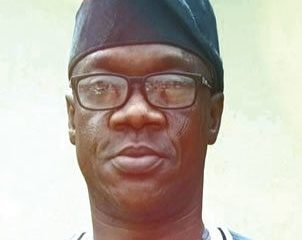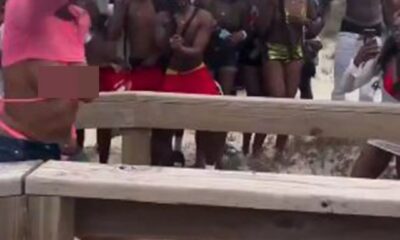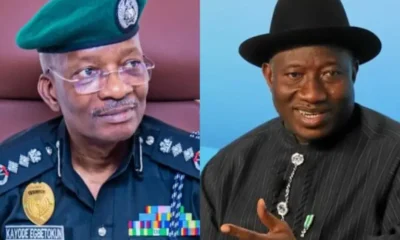News
OPINION: Odi, Zaki Biam And Okuama: Beyond Sentiments
Published
1 month agoon
By
Editor
By Suyi Ayodele
Soldiers voluntarily elected to die the very day they signed up for Military work. They signed up to die at the hands of the enemies. It is a grave abnormality therefore, for soldiers to die in the hands of those they set out to defend. Every society treats its soldiers with respect. In our African traditional settings, we venerate those we engage to guard our towns and villages. We call them Asode, or Olode Oru. While we sleep, caressing our wives, the night guards are in the cold night, watching over our safety and those of our property. That is also the life of an average soldier. Soldiers trade off their comfort for the rest of us to sleep peacefully in our homes. This is how Richard Grenier, a film critic and essayist, obviously quoting George Orwell, describes soldiers in his April 6, 1993 article in The Washington Times: “People sleep peacefully in their beds at night only because rough men stand ready to do violence on their behalf.” The “rough men” referred to here are members of security forces including soldiers and policemen., They risk their lives to defend ours. They deserve our respect and love. So, when soldiers are killed by civilians, like it happened last week in Okuama town of Delta State, such an act stands condemnable. Do we forget history easily in this country?
Dateline was Thursday, November 4, 1999. This democratic dispensation was barely a month old. A retired Army General, Olusegun Obasanjo was the president. Twelve policemen were on an official assignment to Odi, a small community in Bayelsa State. It was at the heat of the agitation by the Niger Delta ‘militants’ for control of the oil in the region. The 12 policemen were ambushed by some gunmen who took them into captivity. Negotiations started. Goodluck Ebele Jonathan, who later became President and Commander-in-Chief of the Armed Forces, was the one assigned to negotiate with the militants. He was then the deputy governor of Bayelsa State. Obasanjo fumed from Abuja. He gave a marching order to the Bayelsa State Government to “produce the policemen ALIVE.” There was tension everywhere. Then the news broke. Seven of the policemen had been killed by their captors, the news was relayed. Wahala! The following day, Friday, November 5, 1999, the remaining five policemen were also murdered by their captors. Twelve lives wasted just like that. The Odi community was on edge. Permutations were on as to what the Federal Government would do or would not do. Many believed that Obasanjo would not want to put Nigeria on the wrong side of the world map, more so when his administration was fledging then. They were mistaken.
The man called Ebora Owu (the Deity of Owu) bided his time. The vulture, we are told, is a patient bird. Days passed, and there was no response from Abuja, the seat of power. Then life returned to normalcy in Odi. Exactly 16 days after the first killing of the seven policemen, tragedy visited Odi. In the early hours of Saturday, November 20, 1999. Odi residents woke up to discover that their community had been surrounded by the Military. Land, air and sea, all covered. No escape route. The Military opened fire on Odi. Nobody was spared; not even animals. Houses were burnt. Only three buildings; a bank, a church and the community’s health centre were spared. While the Human Rights watch and other Civil Society Organisations (CSOs) claimed that more than 900 civilians were killed after the encounter, the Nigerian Military said just about 34 people, including soldiers, died. Later, the Federal Government under the watch of President Jonathan paid the sum of N15 billion as compensation to Odi. But the damage caused by that incident remains unquantifiable till date. That should have been a huge lesson to Nigerians. It never was!
FROM THE AUTHOR: OPINION: Where Are Yoruba’s Soldier Ants?
Barely two years after Odi, another set of felons ambushed some soldiers sent on a peace mission to Zaki Biam town in Benue State, October 10, 2001. The soldiers, 19 of them, were said to be fully armed. However, leaders of the community were said to have persuaded the soldiers to drop their arms such that their presence would not provoke the already charged youths who were at war with their counterparts from Jukun in Taraba State. The soldiers complied. That was their mistake. Hardly had they dropped their arms when boys swooped on them. The 19 of them were murdered and their bodies mutilated! Before killing them, the felons posed with the soldiers, displaying them like trophies won at various competitions. At the funeral rites for the soldiers on October 22, 2001, Obasanjo gave the Military marching order to “track and bring to book”, those responsible for the killing of the 19 soldiers. That is a directive any responsible Commander-in-Chief would give to his troops in such a circumstance. President Bola Ahmed Tinubu gave the same order in almost, if not exactly the same words, on Sunday to the Military high command over the killing of soldiers in Okuama village. Incidentally, the late General Victor Malu, who was the Chief of Army Staff (CoS), when the Odi incident happened, hailed from Zaki Biam. Indeed, the Military went after “those responsible.” By the time the roll call was made, over 100 people were said to have paid the supreme price in Zaki Biam and the adjoining towns of Tse Adoor, Vaase, Sankera, Anyiin, and Kyado. The exercise lasted between October 22 and 24, 2001. Ever since, there has been no report of civilians, under any guise, killing members of the Nigerian Armed forces in their number. We thought we had passed that age of barbarism. Again, we are all wrong!
But before we treat the latest madness in Okuama in Delta State, it is pertinent for us to point out that irrespective of our emotions over the responses of the Nigerian Military to the killing of their personnel, we also need to understand that when soldiers, or any other law enforcement agent is killed cold-bloodedly, the damage is monumental. We need to realise that for every soldier killed by those they keep watch over; someone’s husband is involved. For every killed soldier, there is a widow. Every soldier killed leaves behind some orphans. Many of them also have parents who are made to bury their children, and those who depend on them. We also need to know the mentality of the Military to these wanton killings of their personnel. What about the psychological effect on the soldier-victims, who at the point of death realised that they were being killed by the very patriots they signed to protect with their lives? As I saw the pictures of the soldiers killed in Okuama, the very mutilated bodies of the armed men, my heart sank. I visualised how they died. I recall here, the graphic image of the young lad, Ikemefuna, as depicted by the master story teller, Chinua Achebe, in his epic novel, “Things Fall Apart.” Ikemefuna, when he received the first blow of the machete, ran to Okonkwo, shouting ‘father’. He was seeking refuge. He thought, given his position in the community, Okonkwo would rise to his defense. But alas, it was the same Okonkwo, who dealt the last blow that sent the lad to the land of no return. Ikemefuna was already a psychological wreck before he hit the ground after Okonkwo dealt him the blow. Nothing can be more tragic than to die at the hands of those who should show one affection and love. That is exactly what happened to the 12 soldiers killed by some untrained children in Okuama. Their killing is as tragic as it is inhuman!
FROM THE AUTHOR: OPINION: What Is Killing Our Obas?
And we should not forget. The Military has a different mentality. Iselin Sija Kasperen, a military sociologist, with preference for identity, moral dilemmas, gender and the use of force, published an online article titled: “New societies, new soldiers? A soldier typology”, on June 28, 2020. In the abstract to the article, here is what she says of a soldier: “The term ‘soldier’ is frequently conceptualized as a warrior, a peacekeeper, or a hybrid of both. However, recent changes in the utilization of soldiers in societies have moved the repertoire of possible ways to think, act, and behave beyond these notions. As such, there exists an undertheorized gap between different expectations of soldiers and actual soldier roles. This presents a need for more nuanced and analytically useful conceptualizations of soldier roles. This article provides a more thorough understanding of the soldier role by identifying seven ideal types of soldiers: the warrior, nation-defender, law-enforcer, humanitarian, state-builder, and the ideological, and contractor soldiers. The typology offers an analytical tool with the capacity to maneuver the empirical reality, which is important because how soldier roles are constructed affect how military personnel understand their role in the postmodern world, where identity is multifaceted and negotiable. Ultimately, identity influences how soldiers interact with societies and how societies respond to war, conflicts, and crises.” Concluding the piece, Kaspeten states: “The soldier typology presented in this article improves our understanding of the soldier role. …This is a serious undertaking, as the way soldiers understand their role in today’s postmodern world, where identity is multifaceted and negotiable, influences how they will perform their role. How society and soldiers construct the soldier roles are critical as it affects soldierly conduct; particularly, how soldiers interact with society and how societies respond to war, conflicts, and crises.”
Come to think of it. In a conventional war, before an officer in the rank of a Lieutenant Colonel would be killed, only God knows how many other rank and file would have died. The Commanding Officer, a Lieutenant Colonel, two Majors and nine soldiers were all wasted for doing their job! How else would the Military have responded? Agreed, many innocent people were made to pay the price. That in itself is bad. I saw the video of the burning of houses in Okuama. Many of the buildings were built by average ‘strugglers’; the poor of the poor. I pity those families who will never recover after this ugly incident. My heart goes to those parents who will never see their children again. What about the toddlers, children and wards, who have suddenly become orphans and homeless because of the madness of a few misguided youths? What sort of barbarism would make a set of people to murder soldiers and mutilate their bodies? I saw soldiers without arms, legs and private parts; all cut off by their killers! Some were decapitated! Imagine the agony the soldiers passed through. Think about the pains; picture the gruesomeness of their death. Now think about your pity for the residents of Okuama town. Which do you consider justifiable? Who does that what the Okuama’s youths did? How else do you define barbarism? To prove what point? Which Military would allow such madness go unpunished? These are the issues at the base of the criminality that took place in Delta State.
FROM THE AUTHOR: OPINION: Restructure Nigeria Before We All Die
Yes, nobody should justify the reaction of the Military in this case. Heavens know that I am not by any means justifying that. Two wrongs would not make a right. It was bad for bandits to kill innocent soldiers. It was equally bad for retaliating soldiers to level innocent villagers and their villages. However, my mind agrees with the saying of my people that he who sells sand as goods will be paid back in pebbles – eni ba ta oja yepe; dandan ni ko gbowo okuta. Our elders warn that if your neighbour is feasting on poisonous insects, raise the alarm quickly otherwise, you will not sleep at all again at night. The Okuama youths should have learnt from history. If those felons were too young to witness Odi and Zaki Biam, their parents should have told them the stories. This is a lesson for all community leaders, especially in those towns, where the youths have taken over the ladder of leadership from their fathers. Sentiments apart, no one of us will be safe again if boys can just round up soldiers, kill them and thereafter go to relax with a bottle of gin and grasscutter venison. When you kill a soldier, you should expect grave repercussions. It is like what Achebe, again, says about a woman who comes home with ants-infested fire woods. Her compound must surely play host to a lounge of lizards. While I grieve at the calamity the Okuama badly-brought up youths brought upon their town, my heart goes to the families of those slain officers and men of the Nigerian Army. May their services to their fatherland not be in vain. Rest in peace, gallant soldiers.
You may like


Bello And Enenche: A Tale Of Two Lions [OPINION]


OPINION: Why Were Miyetti Allah And Tinubu’s Iyaloja In Ibadan?


OPINION: Bobrisky’s Masque, Yahaya Bello’s Boa


OPINION: Onitiri-Abiola And The Madness In Ibadan


OPINION: For Yoruba Muslims And Pentecostals


OPINION: Bobrisky And Our Other S/He Offsprings
News
Pollution: Activists Want N’Delta Environmental Remediation Trust Fund Established
Published
12 mins agoon
April 27, 2024By
Editor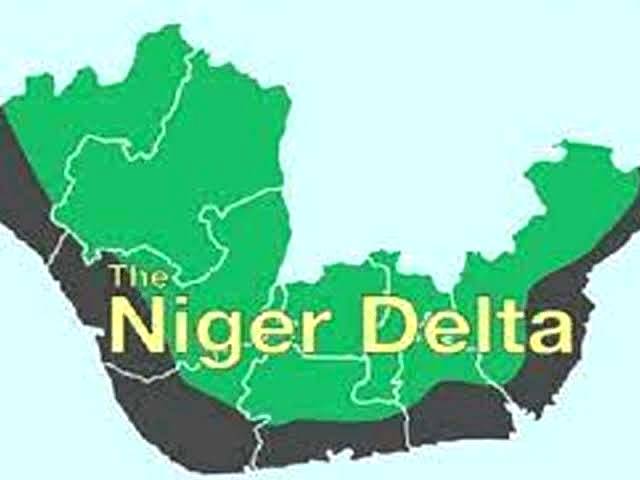
By Joseph Ebi Kanjo
Environmental activists under the aegis of Coalition for a Clean Niger Delta (CCND), over the weekend called on President Bola Tinubu “to resolve the Ecocide (Environmental Genocide) in the Niger Delta, that increasingly threatens the continued existence of the entire region.”
This is contained in a statement jointly signed by Dr. Nnimmo Bassey, Executive Director, Health of Mother Earth Foundation (HOMEF) and
Otive Igbuzor, Founding Executive Director, African Centre for Leadership, Strategy & Development (Centre LSD), and made available to INFO DAILY.
According to the duo, to address the ‘environmental genocide’ in the region, President Tinubu needs to urgently issue an “Executive Order creating a Niger Delta Environmental Remediation Programme and Trust Fund.”
READ ALSO: Oil Spill: Pay A Visit To Impacted N’Delta Communities, Environmental Activists Urge Tinubu
CCND said the Trust Fund, when established, could either be an independent body or or “domiciled in the extant Hydrocarbon Pollution Remediation Project (HYPREP) currently overseeing the cleanup of Ogoni Land, but with a separate Trust Fund from the Ogoni Trust Fund, an expanded Governing Council and an unimpeachable Management system designed to avoid the contradictions that have historically bedeviled HYPREP and the debatable progress of the Ogoni Cleanup.”
Outlining tasks of the Trust Fund, the environmental activists said “the Programme would include a definitive health audit besides the standard environmental audit of impacted areas.
“Adoption of the National Principles on Divestment and Decommissioning in the Nigerian Oil Industry in line with the one recently compiled by a wide coalition of community, civil society and international organizations, following extensive field missions and engagements in the Niger Delta.”
READ ALSO: Three Suspected Pipeline Vandals Caught In Edo
The duo, while stating that the Trust Fund would serve as a panacea for Oil theft and asset vandalisation, added that it would “minimize re-pollution, optimize production and abate associated insecurity, enact a carefully articulated approach to this economic crime (based on broad and in-depth stakeholder consultations, which we are prepared to be part of if required).”
They added: “The new strategy should be preventive, proactive, inclusive, accountable, and look beyond current official reliance on state and non-state military methods that can often be tragically counterproductive, as results have shown intermittently.”
On how to fund the Trust Fund, the environmental activists recommended that “the primary funding should be from the operators and JV partners in oil/petroleum leases, based on credible costings for remediation within their respective acreages and in line with the universal Polluter Pays Principle (PPP).”
They added: “Additional funding sources could include (I) the Environmental Remediation Fund created but yet to be operationalized under the Petroleum Industry Act, (II) gas flare penalties paid by operators, (III) part of the existing Ecological Fund, at least to cover immediate region wide impact and cost assessments, (IV) a portion of the statutory funds of the Niger Delta Development Commission, whose statutory mission expressly includes an ecological/pollution resolution mandate that is largely neglected since its inception, (V) Decommissioning liabilities and restoring funds in oil mining agreements and (VI) international environmental, climate and impact funds/resources that can be leveraged through appropriate strategies and channels.”
News
Oil Spill: Pay A Visit To Impacted N’Delta Communities, Environmental Activists Urge Tinubu
Published
21 mins agoon
April 27, 2024By
Editor
By Joseph Ebi Kanjo
Environmental activists under the aegis of Coalition for a Clean Niger Delta (CCND), weekend, urged President Bola Tinubu to visit communities impacted by oil spill and pollution in the Niger Delta region.
Dr. Nnimmo Bassey, Executive Director, Health of Mother Earth Foundation (HOMEF) and
Otive Igbuzor, Founding Executive Director, African Centre for Leadership, Strategy & Development (Centre LSD), made the call in a statement made available to INFO DAILY.
They lamented that for over seventy years, the ecosystem of the Niger Delta has been “plagued by unprecedented perennial pollution from petroleum production activities, enabled or worsened by a highly dysfunctional, conflicted and compromised environmental regulatory system, since the country struck commercial oil in the Oloibiri Province prior to Nigeria’s Independence.”
The environmental activists, while advocating for the clean up of the region particularly impacted communities, said Nigeria, being a member of international treaties and conventions, including those on universal rights, environmental and indigenous people’s rights, and climate change, cannot be a difference from other oil producing nations.
READ ALSO: Cultists Arrested For Invading Anambra Hotel With Charms
The statement partly reads: “We invite Mr President to pay a spot visit, along with the relevant Ministers and Regulators, and possibly the National Security Adviser, to some of the following locations, which are too few as examples of devastation, to see for yourself: Polobubo and Ogulagha in Delta State; Ibeno, Mbo and Ikot Ada Udo in Akwa Ibom State; Awoye in Ondo State; Bille, Obagi and Rumuekpe in Rivers State; and Gbarain/Ekpetiama, Nembe,Aghoro and Otuabagi (where Nigeria’s pioneer oil wells are located) in Bayelsa State.
“Amidst the global dynamics of the 21st Century, and particularly in the context of climate change/action, Nigeria cannot continue to act as if ignorant of the importance of its biodiversity endowments and ecological imperatives.
“There are many countries we can benchmark, which produce more oil, gain far higher revenues from it, but still jealously and profitably protect their environment and ecosystems. Norway which has a trillion-dollar Sovereign Wealth Fund from petrodollars (and population of 5.5 million, against Nigeria’s 228 million) is a prime example, but ensures its waters stay pristine, enabling its robust fishing and marine industries. Scotland and the UAE are others.
“We trust that Mr President and the government are mindful of Nigeria’s numerous commitments to international treaties and conventions, including those on universal rights, environmental and indigenous people’s rights, and climate change.
READ ALSO: Three Suspected Pipeline Vandals Caught In Edo
“Mr President’s commitments to a world audience at the UN Climate Conference (COP 28) in Dubai, UAE, barely four months ago are also fresh in mind.”
The statement added: “A genuine action to cleanup the Niger Delta will be an excellent progress report for Nigeria, and particularly for Your Excellency, as the world gathers again at the next Climate Conference, COP 29, in about six months from now.
“The protracted social injustice of funding national development at such extreme ecocidal expense of communities in the oil-producing Niger Delta region, or communities wherever else in Nigeria, needs to be urgently redressed, without any pretences as witnessed under previous Administrations.
“With the ongoing divestment of their remaining onshore holdings in Nigeria by the major international oil companies (IOCs), and their huge outstanding environmental liabilities thrown into legal uncertainty, thereby portending further risks and escalation of social tensions for communities, the time for Mr President to act as the Protector-in-Chief of Nigerian communities is now.”
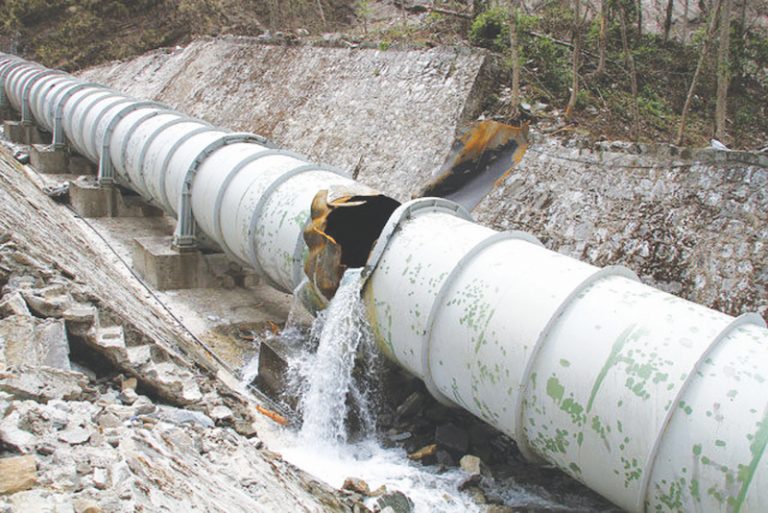
The Edo State Police Command has arrested three pipeline vandals in the Obazagbon community of the Orhiomwon Local Government Area.
The suspects include Jackson Aluche, aged 45; Oke Okoro, aged 30; and Oluchukwu Chukwuma, aged 18.
It was gathered that the incident occurred on April 14 at about 10:30 a.m.
READ ALSO: Kanye West To Launch Yeezy P0rn Studio With Stormy Daniels
When contacted by our correspondent, the state Police Public Relations Officer, Chidi Nwabuzor, confirmed the incident.
He added that the suspects were caught siphoning crude oil and smashing a PAN Ocean Oil Corporation pipeline.
Nwabuzor noted that the suspects admitted to the crime, claiming that one AKA Doctor had hired them to carry out the deed and that they would be charged with court charges.
READ ALSO: Two Fake Police Inspectors Arrested In Edo
He said, “On April 14, 2024, at about 1030 a.m., the operatives of the State Criminal Investigation Department, while acting on credible intelligence, arrested three suspects, namely, Jackson Aluche, 45 years old; Oke Okoro, 30 years old; and Oluchukwu Chukwuma, 18 years old, at Obazagbon community in Orhiomwon Local Government Area of Edo State.
“They were caught breaking a crude oil pipeline for Pan Ocean Oil Corporation and siphoning crude oil. The suspects made statements and confessed to the crime, saying that they were employed by AKA Doctor to carry out the act. Suspects will soon be charged in court.”

Pollution: Activists Want N’Delta Environmental Remediation Trust Fund Established

Oil Spill: Pay A Visit To Impacted N’Delta Communities, Environmental Activists Urge Tinubu

Three Suspected Pipeline Vandals Caught In Edo
Trending

 Entertainment5 days ago
Entertainment5 days agoBridesmaids’ Dance At Wedding Causes Stir On Social Media [VIDEO/PHOTOS]

 Metro5 days ago
Metro5 days agoVIDEO: ‘UNN Lecturer’ Caught Pants Down With Married Student

 News3 days ago
News3 days agoDrama! Supporters Of Yahaya Bello Perform Rituals to Prevent His Arrest By EFCC [Video]

 Headline3 days ago
Headline3 days agoDrama As Women Fight Dirty, Breasts Fall Out During Spring Break Outing In US [PHOTOS/VIDEO]

 News3 days ago
News3 days agoVIDEO: Force PRO Orders Arrest Officers Caught On Video Bashing Driver’s Car

 Entertainment3 days ago
Entertainment3 days agoNollywood Actor, Zulu Adigwe Is Dead

 Headline3 days ago
Headline3 days agoMeet 17-year-old Nigerian Who Won $3.5m Worth Of Scholarships From Harvard, 13 Other Foreign Universities

 Metro3 days ago
Metro3 days agoEdo Cultists Kill Rival In Daughter’s Presence, Abandon Getaway Car

 News5 days ago
News5 days agoIGP, Jonathan Disagree Over State Police

 Headline3 days ago
Headline3 days agoVideo Of Girl Being Bullied, Slapped At Lead British School Sparks Outrage Online [PHOTOS/VIDEO]


